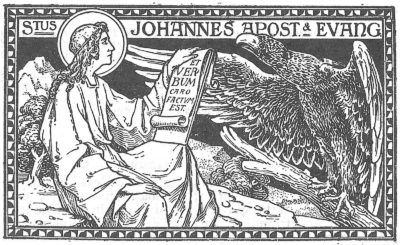 On the Liturgical Calendar used in the LCMS, today is set aside to remember St. John. He was a son of Zebedee and brother of James the elder (whose festival/feast day is July 25). John was among the first disciples to be called by Jesus (Matthew 4:18-22) and became known as “the disciple whom Jesus loved,” as he refers to himself in the Gospel that bears his name (e.g., John 21:20). Of the Twelve, John alone did not forsake Jesus in the hours of His suffering and death. With the faithful women, he stood at the cross, where our Lord made him the guardian of His mother. After Pentecost, John spent his ministry in Jerusalem and at Ephesus, where tradition says he was bishop. He wrote the fourth Gospel, the three Epistles that bear his name, and the Book of Revelation. Especially memorable in his Gospel are the account of the wedding at Cana (John 2:1-12), the “Gospel in a nutshell” (John 3:16), Jesus encounter with the Samaritan woman at the well (John 4:1-43), Jesus’ saying about the Good Shepherd (John 10:11-18), the raising of Lazarus from the dead (John 11), and Jesus’ encounter with Mary Magdalene on Easter morning (John 20:11-18). According to tradition, John was banished to the island of Patmos (off the coast of Asia Minor) by the Roman emperor Domitian. John lived to a very old age, surviving all the apostles, and died at Ephesus around 100 AD. He is also called St. John the Theologian.
On the Liturgical Calendar used in the LCMS, today is set aside to remember St. John. He was a son of Zebedee and brother of James the elder (whose festival/feast day is July 25). John was among the first disciples to be called by Jesus (Matthew 4:18-22) and became known as “the disciple whom Jesus loved,” as he refers to himself in the Gospel that bears his name (e.g., John 21:20). Of the Twelve, John alone did not forsake Jesus in the hours of His suffering and death. With the faithful women, he stood at the cross, where our Lord made him the guardian of His mother. After Pentecost, John spent his ministry in Jerusalem and at Ephesus, where tradition says he was bishop. He wrote the fourth Gospel, the three Epistles that bear his name, and the Book of Revelation. Especially memorable in his Gospel are the account of the wedding at Cana (John 2:1-12), the “Gospel in a nutshell” (John 3:16), Jesus encounter with the Samaritan woman at the well (John 4:1-43), Jesus’ saying about the Good Shepherd (John 10:11-18), the raising of Lazarus from the dead (John 11), and Jesus’ encounter with Mary Magdalene on Easter morning (John 20:11-18). According to tradition, John was banished to the island of Patmos (off the coast of Asia Minor) by the Roman emperor Domitian. John lived to a very old age, surviving all the apostles, and died at Ephesus around 100 AD. He is also called St. John the Theologian.
That is my favorite appellation for John. He is a theologian of the highest degree. A theologian is literally one who speaks words about God and John is the one who calls Jesus the “Word of God”. His theology soars and hence the eagle. His description of the coming of Christ in chapter 1 of his Gospel is quite stunning and his epistles are consoling. He is the apostle of mercy and the third chapter of his first letter talks about us being able to console ourselves so when our hearts condemn us, God who is greater than our hearts reassures us. He soars from the beginning of creation to the end of the ages and throne of God in eternity and at the end of his life the great theologian had a one sentence sermon – “little children let us love one another”.

